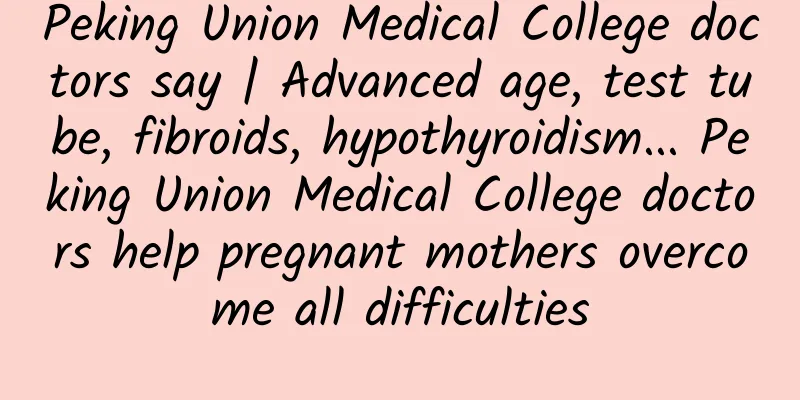Peking Union Medical College doctors say | Advanced age, test tube, fibroids, hypothyroidism... Peking Union Medical College doctors help pregnant mothers overcome all difficulties

|
Xiao A, a 40-year-old primipara, had intussusception surgery when she was 1 year old. She was diagnosed with uterine fibroids 10 years ago, but no special treatment was given at the time. Last year, the fibroids had grown to nearly 8 cm in size. In the same year, she was diagnosed with subclinical hypothyroidism (hereinafter referred to as "hypothyroidism"). Due to unexplained infertility, she chose to have an IVF. However, a nutritional screening at 9 weeks of pregnancy found hyperhomocysteinemia, elevated glycosylated albumin, high folate, and vitamin D deficiency... Advanced age, IVF, uterine fibroids, hypothyroidism, each of these keywords requires pregnant mothers to be highly vigilant. Today, obstetric experts from Peking Union Medical College Hospital analyzed these situations separately, hoping to give some inspiration to pregnant mothers. About the author: Ma Liangkun Chief physician of obstetrics department of Peking Union Medical College Hospital, specializes in perinatal care, obstetric complications and comorbidities, prenatal diagnosis and genetic counseling. Advanced age With the relaxation of the three-child policy, more and more families choose to have another baby, and many pregnant mothers are already in advanced age. Pregnant women who are over 35 years old at the expected date of delivery are considered to be in advanced pregnancy. Advanced age itself increases the risk of embryo arrest in early pregnancy, the risk of fetal chromosomal abnormalities and malformations in mid-pregnancy, and the risk of pregnancy complications such as gestational diabetes and gestational hypertension. There are also uterine atony, dystocia, postpartum hemorrhage, etc. during delivery, which will make the pregnancy process more difficult. Xiao A is now 40 years old, which is classified as orange risk in the pregnancy risk classification. Therefore, she needs to "take care of her own business and not worry about God's business". Age is an unchangeable factor. Instead of worrying about these risks and lamenting that time is not easy, it is better to strengthen the knowledge of pregnancy, manage her lifestyle, and do her best to reduce the risks that can be reduced, and at the same time accept the results that cannot be changed. (We will launch specific operation strategies in the future, and pregnant mothers are welcome to continue to pay attention~~) IVF At present, there are many couples who use assisted reproductive methods such as in vitro fertilization to achieve pregnancy for various reasons. However, compared with the natural pregnancy process, in vitro fertilization pregnancy is more likely to bring psychological pressure to pregnant mothers. If there is tension or anxiety, the couple can seek psychological counseling. It is very necessary to relieve tension through mindfulness meditation. Pregnant mothers with anxiety, depression, insomnia and other symptoms due to IVF or adverse pregnancy and delivery history are advised to go to the perinatal psychological counseling clinic for treatment. They can also participate in experiential classes in pregnant women schools such as Balint groups, sculptures, and group counseling. Hypothyroidism Subclinical hypothyroidism is becoming more and more common in the general population, and pregnant women are also prone to fluctuations in thyroid function due to changes in hormone levels during pregnancy. Xiao A suffered from subclinical hypothyroidism before she became pregnant and began taking Euthyrox for treatment. In addition, the demand for thyroid hormone increased in early pregnancy, so she needed to monitor and recheck her thyroid function regularly, and she also needed to understand her iodine nutritional status, including serum iodine and urine iodine creatinine levels. Some families with patients with thyroid disease will blindly choose iodine-free salt, causing the whole family to be in a state of iodine deficiency. However, the demand for iodine during pregnancy will increase from 160 micrograms per day before pregnancy to 230 micrograms. Severe iodine deficiency in pregnant mothers can lead to infantile cretinism, affecting the child's growth, development and intelligence. Therefore, normal thyroid function and reasonable iodine nutrition status must be ensured during pregnancy to reduce the impact on pregnancy and the fetus. Of course, it would be more ideal if appropriate prevention and treatment are carried out before pregnancy, such as evaluation and adjustment of thyroid function and iodine nutrition status. Uterine fibroids Uterine fibroids are the most common benign gynecological tumors, with an incidence of about 20% to 30%, mainly occurring in women of childbearing age. With the development and popularization of medical imaging technology, especially ultrasound technology, the actual incidence of uterine fibroids may be higher, which means that more and more women may find uterine fibroids before giving birth. So for those pregnant women who are already pregnant and have uterine fibroids, what impact will uterine fibroids have? Take Xiao A as an example. Her uterine fibroid is 7.6*4.9cm and is located in the lower part of the posterior wall. It is close to the size of a medium-sized apple. It is an intramural uterine fibroid. Growing in the uterus will have many effects on pregnancy and delivery. If the fibroid is too large or located in the lower part of the uterus, it may cause the following effects on pregnancy, delivery and postpartum stages. 1. Threatened miscarriage in early and mid-pregnancy. 2. Threatened premature labor, malposition of the fetus, premature rupture of membranes in the late pregnancy, as well as dystocia, cesarean section, midwifery and postpartum hemorrhage. 3. Excessive menstruation, secondary anemia, and iron deficiency caused by uterine fibroids will also increase the risk of anemia during pregnancy and postpartum. 4. Pregnancy also has an impact on fibroids. Some pregnant women may experience red degeneration of uterine fibroids during pregnancy, which is manifested by rapid enlargement of fibroids, abdominal pain, fever and elevated blood count. Once the above situation occurs, I believe many doctors and pregnant mothers will be worried, so they choose to stay in bed and reduce activities to avoid or reduce risks. However, it should be noted that bed rest and immobilization will have greater impacts, such as: 1. Negative emotions . Pregnant mothers who stay in bed for a long time will frequently check their phones. Once they see negative news, they will easily fall into a vicious cycle of negative emotions such as worry and anxiety. 2. Negative emotions often affect appetite , leading to failure to gain normal weight during pregnancy, and increasing the risk of multiple malnutrition such as anemia and low protein. Lack of sunlight can cause vitamin D deficiency or even depletion, increase the risk of fetal calcium deficiency, and affect the health of fetal bones and teeth. 3. Muscle atrophy due to disuse . There have been pregnant women who have been hospitalized for fetal preservation and bedridden for several months. When they first got out of bed, they were so weak that they fell down and could not walk. At the same time, due to insufficient core muscle strength, they would feel distended and uncomfortable in the lower abdomen and increased uterine contractions, leading to threatened premature birth or the need for medical intervention. 4. Immobilization and hypercoagulable state during pregnancy also increase the risk of deep vein thrombosis in the lower extremities . This refers to abnormal coagulation of blood in the deep veins, forming thrombi (blood clots), which partially or completely block the venous lumen. The lower extremities are the most common site for deep vein thrombosis. If the thrombus breaks off and enters the circulatory system and embolizes (blocks) the pulmonary artery, it may cause respiratory and circulatory dysfunction or even death. After pregnancy, the gradually enlarging uterus will compress the inferior vena cava and iliac veins, causing poor venous return and slow blood flow in the lower limbs. During pregnancy, the placenta produces a large amount of estrogen, which promotes the liver to produce various coagulation factors, causing the blood to be in a hypercoagulable state. In addition, the reduction in activity caused by immobilization slows down the blood flow in the lower limbs, so pregnant women who are bedridden are prone to deep vein thrombosis in the lower limbs. If the lower limbs of pregnant mothers suddenly swell in a short period of time, be careful, because blood clots blocking venous return will cause edema of the affected limbs, and you need to go to the hospital for examination immediately. 5. Women will secrete a large amount of progesterone after pregnancy , which will reduce the power of gastrointestinal peristalsis. When there is not enough water in the gastrointestinal tract and there are more food residues, it is easy to cause dry stools that are difficult to excrete. The growing uterus will cause mechanical compression on the gastrointestinal tract. Pregnant women who are bedridden will also increase the risk of constipation due to insufficient dietary fiber intake, insufficient activity, insufficient drinking water, and holding back stool. In addition, the abdominal wall muscle contraction force of pregnant women at this time is insufficient, which will also make constipation more likely. Long-term constipation can lead to varicose veins around the rectum and the formation of hemorrhoids. Due to difficulty in defecation, pregnant mothers often need to spend more effort to expel feces. In the long run, it will cause anal fissures and negative emotions. Constipation is also a manifestation of an imbalance in the microecology of pregnant mothers, that is, a state where harmful bacteria outnumber beneficial bacteria. Recent studies have shown that mothers and newborns share bifidobacterium colonies, and the state of the mother's intestinal flora affects the establishment and health of the newborn's flora. Abnormal flora in pregnant women increases the risk of obesity, allergies, autism and other diseases in their offspring. 6. Pregnant mothers who are resting in bed may reduce their water intake because they are not used to urinating in bed or it is inconvenient to get out of bed to go to the toilet, thereby increasing the risk of urinary tract infection. Urinary tract infection will increase the risk of fever, uterine contraction, and premature birth. These are all problems that may occur after bed rest, and various relevant literatures do not support the view that "bed rest can reduce the probability of threatened abortion and threatened premature birth." Content from: Ma Liangkun, a doctor at Union Medical College Hospital |
Recommend
Female armpit pain without lump
In clinical practice, many female patients experi...
Tumor markers elevated? Don’t panic! Here’s the truth!
Tumor markers elevated? Don’t panic! Here’s the t...
Animals can also become "addicts"! How do drugs make the brain addicted?
Maybe you have seen the dog in the picture below,...
Can I practice yoga during my period?
There are many things we need to pay attention to...
Can I do sit-ups after confinement and what are the precautions?
We all know that mothers will stay in confinement...
Can pregnant women eat dried plums?
There are many foods that pregnant women should n...
How long after induced abortion can I go out?
Generally, after ninety days of pregnancy, if the...
Abdominal pain after ovulation
When the follicles in the ovaries gradually grow ...
Why did my period stop after 2 days?
As we all know, after women have their periods du...
What is the reason for brown vaginal discharge before menstruation?
Women's reproductive health has begun to rece...
What are the causes of frequent headaches? How to take care of them in daily life?
Headache, as a common physiological phenomenon, a...
Can I eat white vinegar during menstruation?
White vinegar has many uses. Some people use it a...
What to do if you have chest pain in late pregnancy
Chest pain in the late pregnancy is a symptom tha...
There is a line under the belly button of a girl
Many people may have noticed the phenomenon that ...









